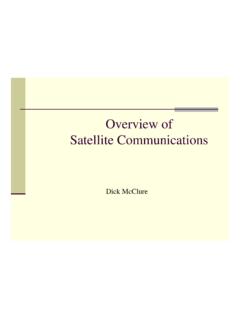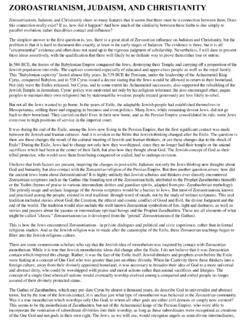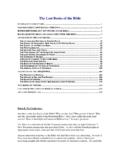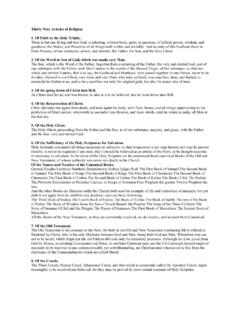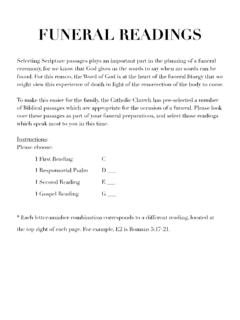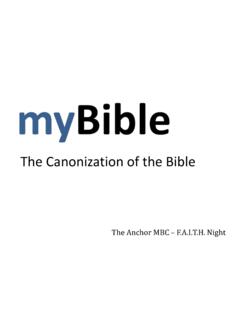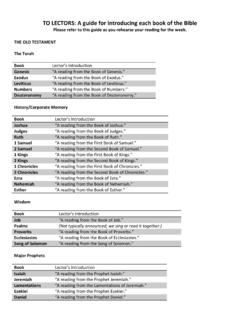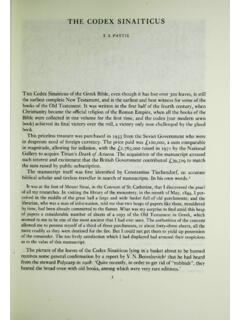Transcription of The Books of the Maccabees - George Mason University
1 The Books of Books of the MaccabeesFocus What are the Books about? Why were the Books written? When were the Books written? Where are the Books found? Who accepts the canon? What are the book s lasting implications?The Books1 Maccabees : A history-Mattathias and his five sons deliver Israelfrom the threat posed to Judaism by Maccabees : Generally parallels 1 Maccabees but presents atheological interpretation of letters to the Jews in Egypt giving direction concerning thecelebration of the feasts of Booths and Maccabees : incident involving Egyptianpersecution of Jews in the 3rdcent to do withMaccabean Maccabees : An expansion of 2 Maccabees 6:18-7.
2 42 Presents an interpretation of Judaism in terms of Greek Books of the MaccabeesSeptuagint, Background, 1 Maccabees 23 Mar1 Maccabees , 2 Maccabees30 Mar4 Maccabees6 Apr3 Maccabees , Summary/ Influence 13 AprHow Christianity Lost its Jewish Roots20, 27 Apr, 4, 11 May(Wed09:40 11:05)The Books of the MaccabeesThe Books of the Maccabees (1, 2, & 4) recounthow the his five sonsdelivered Israel from the threat posed to Judaismby IV (and renegadeJews)..and restored political independence andreligious freedom to Israel after 4 SeptuagintHebrew Scripture of the DiasporaThe SeptuagintThe Alexandrian Canon A Greek translation of Hebrew scriptures compiled in Alexandriafor the Jews outside of the homeland.
3 Made from Hebrew or Aramaic originals (although few of theseearly scriptures survive in anything but fragments). Began in 3rdcentury BCE not considered a closedcanon because texts continued to be added after the in Greek original ,,, apparently into the 1stcentury CE. Was considered authoritative by Jews of the Diaspora. Used by Philo, discussed by Septuagint Hellenized (Greek speaking) Jews worldwide (outside ofIsrael) were using the Septuagint by the start of the commonera and during the formative years of Christianity (late SecondTemple Period).
4 Numerous references (~250) to the Hebrew Scriptures made inthe Christian Scriptures (New Testament). Over half areclearly from the Legend From the Letter of Letter states that it was written by an aide to Ptolemy in 3rdcentury probably written by an Alexandrian Jew~ 150-100 BCE. Ptolemy II, king of Egypt (285-247 BCE) wanted the Hebrewscriptures in the library he was building in Alexandria. 72 scholars were brought from from each of thetwelve tribes. answered 72 questions were led to the island of Pharos where they labored for 72 days,independently, but each had identical translations.
5 The perfect translation The SeptuagintAlthough the Septuagint was a Jewish translation, and widely used,the earliest copies available today are all from later Christiansources: Codex Vaticanus (4thcentury) Codex Sinaiticus (4thcentury) Codex Alexandrinus (5thcentury)..and these copies are not all we speak of the Septuagint it isimpossible to know exactly what that collection used by Jews of the Diaspora during the late Second Septuagint(s) and the MaccabeesCodexVaticanusCodexSinaiticusCo dexAlexandrinusCanonical1 MaccabeesXXRoman CatholicOrthodox2 MaccabeesXRoman CatholicOrthodox3 MaccabeesXOrthodox4 MaccabeesXXCoptic (Orthodox)The BackgroundAfter the destruction of Jerusalem and the Temple (70 CE),Jewish scholars took refuge in Yavneh (var Jabneh, Jamnia)
6 (70-132 CE). The embryonic beginnings of Rabbinic Judaism. Judaism began to center on Torah instead of Temple; on prayerand charitable acts instead of sacrifice. Scripture took ongreater importance. Not all Books in the Septuagint are accepted, or even considered. Although some of the Septuagint translations date to 3rdcenturyBCE, those now considered Apocrypha date primarily from early2ndcentury BCE to mid 1stcentury end of Prophecy Prophecy is considered to have ended in the period after the returnof the exiles from Babylon (538 BCE).
7 Prophets Haggai and Zechariah (~ 520 BCE) see hope of theestablishment of a messianic kingdom. the Temple. Temple BCE. Priesthood takes on greater role. Beginning of Second Temple Judaism. Prophet Malachi condemns attitude of the ~500-450 BCE Reminiscent of pre-exilic prophet Talmud states that there was no more prophecy in the SecondTemple era (Talmud Sotah 48b)Hebrew Scripture(s)The final form of the Hebrew TaNaKh ( ;Nevi ; ) was not decided until~3rdcentury CE. By the end of 1stcentury CE there is clearly an awareness of closed numbers the sacred Books .
8 The Torah and Prophets were fixed while the Writings were still in flux. No Books of the post-prophecy era were considered for inclusion. It wasn t until 930 CE that the first complete Hebrew Bible, called theAleppoCodex, utilizing masoretic symbols and ordering was Text. The earliest extant authoritative Masoretic text of the Hebrew Scriptures datesto 1009 Old Testaments Roman Catholics and Eastern Orthodox use the Septuagint(s) as thesource of their Old Testament ..Hebrew Scriptures. Roman Catholics accept/ include 1, 2 Maccabees Most Eastern Orthodox accept/ include 1,2,3 Maccabees Some Non-Chalcedonian churches ( , Coptic, Syriac) accept/ include1,2,3,4 MaccabeesProtestants generally use the Palestinian Canon as the source oftheir Old Testament.
9 Hebrew Scriptures. The 39 Books of the Protestant Old Testament represent the 24 Books of theHebrew ScripturesNo Christian Old Testament exactly equates to the MaccabeesJewish Revolt Against Hellenization2ndcent BCEA History of Israel 1000 900 800 700 600 500400 300 200 100 0 100 200 300 BCECEU nited Kingdom(Saul, David, Solomon)Kingdoms ofIsrael & JudahIsrael conquered by AssyriaJudahBabylonian captivityReturn from exileSecond Temple completedReforms of Ezra & NehemiahJudah-a Persianvassal stateMaccabean RevoltGreekPalestineAlexander the GreatPtolemies/ SeleucidsRomeRevolt Temple destroyedGreat RevoltRoman OccupationHasmon-eansAmos JeremiahEzraMaccabeesHosea HaggaiIsaiah ZechariahMicahMalachiHezekiahBackground To ConflictAlexander the Great dies in 323 BCE Empire divided among generals.
10 Syria , EgyptEventually these cities become more Greek than Greece,Hellenism becomes a buffer between the two states. Many Jews take up the Greek culture. Hasideans (Pious), later Pharisees, are pietist EmpireEarly 2ndcentury BCEB ackground To ConflictJudea comes under Seleucid control in 223 III, 198 BCE, issues decrees favorable to the IV (Epiphanes) becomes Seleucid emperor in ~ 175 BCE. The Magnificent to his The Mad to his enemies. Claims to be the manifestation of Zeus. Desires to fully Hellenize ( make Greek) , the chief priest in Jerusalem, strongly resists IVAntiochus IV Apollo the holy Ephiphanus.

